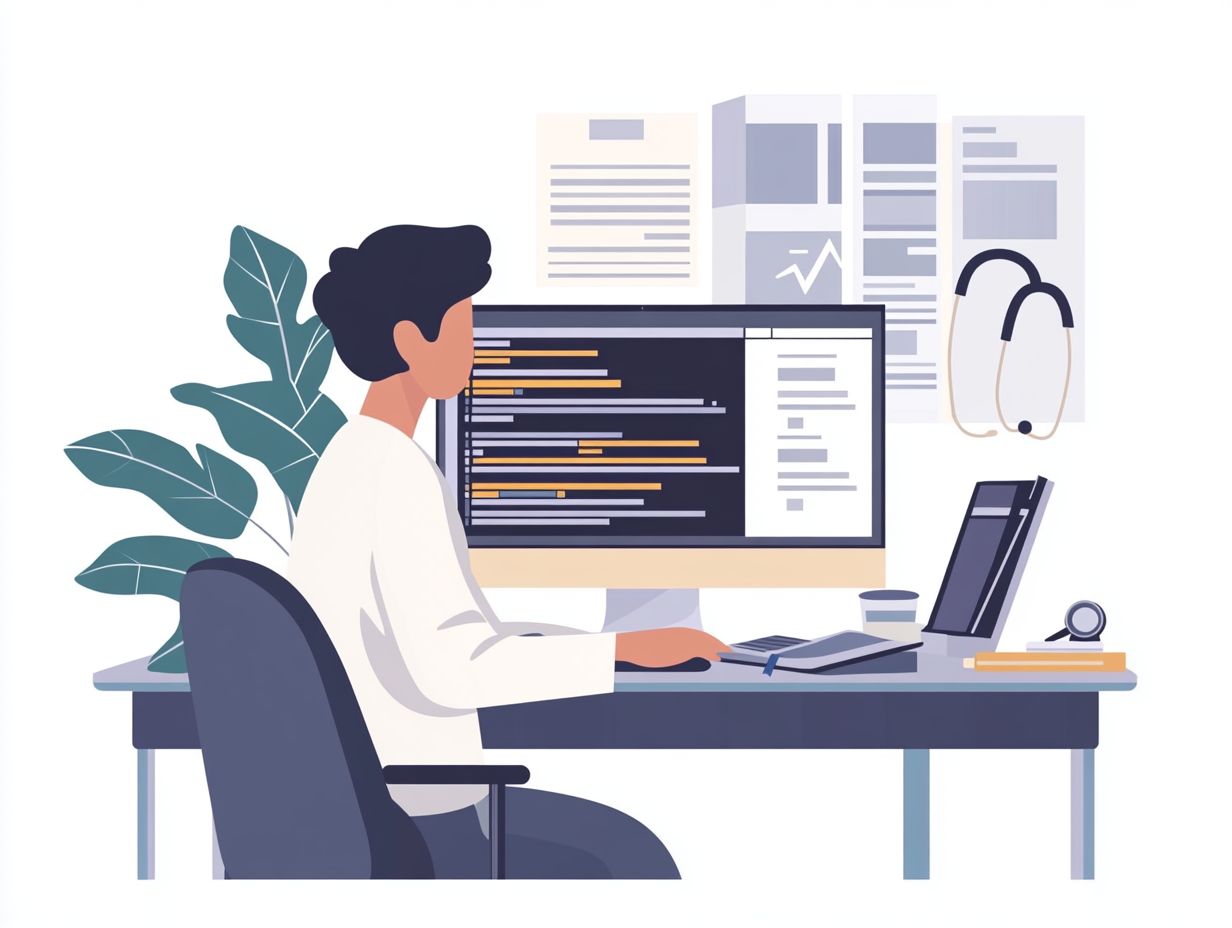What is a Certified Professional Coder (CPC)?
If you’re contemplating a career in healthcare administration, pursuing a Certified Professional Coder (CPC) designation could be a great choice. This certification validates your skills in medical coding and opens up numerous career opportunities.
In this exploration, you’ll discover what it means to be a CPC, why certification is important, and what requirements you must meet. You’ll also learn about the benefits, such as higher salaries and better job security.
This certification can elevate your career and ensure you know how to maintain this valuable credential over time.
Contents
- Key Takeaways:
- Overview of Certified Professional Coder (CPC)
- Requirements for Becoming a CPC
- Educational and Experience Requirements
- CPC Exam and Certification Process
- Benefits of Becoming a CPC
- Advantages in the Job Market
- Higher Salary Potential
- Career Opportunities for CPCs
- How to Keep Your CPC Certification Active
- Frequently Asked Questions
- Curious about what a Certified Professional Coder (CPC) is?
- Curious about the education and training required to become a CPC?
- Curious about what the CPC certification exam is like?
- Curious about the benefits of hiring a CPC?
- How is a Certified Professional Coder (CPC) different from a medical biller?
- Are there different types of CPC certifications?
Key Takeaways:

A Certified Professional Coder (CPC) is a healthcare professional who has obtained certification through rigorous training and exams.
CPC certification is highly valued in the healthcare industry. It demonstrates expertise in medical coding and billing.
Becoming a CPC requires meeting educational and experience requirements, passing the CPC exam, and maintaining certification through continuing education.
Overview of Certified Professional Coder (CPC)
The Certified Professional Coder (CPC) credential is essential for anyone venturing into the medical coding field. It is offered by the American Academy of Professional Coders (AAPC).
This credential shows your expertise in various coding systems, including CPT (Current Procedural Terminology), HCPCS (Healthcare Common Procedure Coding System), and ICD-10-CM. It reflects your commitment to coding standards and navigating healthcare regulations, boosting your career prospects.
By mastering these coding guidelines, you’ll ensure accurate insurance claims and reimbursement processes. Your role is crucial in the healthcare industry.
What is a CPC?
A Certified Professional Coder (CPC) specializes in medical coding. They translate medical records into standardized codes essential for billing and insurance.
This role demands accurate assignment of diagnosis and procedure codes according to established standards like ICD-10, CPT, and HCPCS. A CPC streamlines reimbursement for healthcare providers and helps maintain compliance with healthcare regulations.
Regular collaboration with physicians, nursing staff, and billing departments makes the CPC s contributions invaluable in healthcare settings.
As a CPC, you stay updated on coding guidelines and payer policies. This helps reduce claim denials and fosters efficient revenue cycle management.
Importance of CPC Certification
The CPC certification is vital for aspiring medical coders. It validates your expertise in coding standards and enhances your job prospects in healthcare.
By obtaining this certification, you establish credibility in a competitive field. It signals to employers that you have the skills needed to navigate complex coding systems.
Certified professionals often have better chances for career advancement since organizations prioritize candidates who meet recognized industry standards.
The financial benefits can be significant; studies show that certified coders earn higher salaries than non-certified peers.
Pursuing this certification aligns perfectly with the evolving expectations of the healthcare industry. It prepares you to tackle current challenges effectively.
Requirements for Becoming a CPC
To earn your Certified Professional Coder (CPC) designation, meet specific requirements that combine educational credentials with hands-on coding experience. You’ll also need to pass the CPC exam offered by the AAPC.
These criteria ensure you have a solid understanding of medical terminology, anatomy, and coding guidelines. This preparation sets you up for success in the dynamic field of medical coding.
Educational and Experience Requirements

To qualify for the CPC exam, you need at least a high school diploma and relevant training in medical coding. Practical coding experience in healthcare settings is also essential.
You can explore various educational programs tailored to your needs. Online courses offer the flexibility to learn at your own pace, especially if you’re juggling work and study.
Community colleges often provide associate degrees in health information technology. These programs blend coding with a broader health sciences education. Certification programs specifically designed for coding can enhance your understanding and skill set.
Gaining hands-on experience, particularly in medical facilities, is crucial. It helps you grasp the nuances of coding and is a key requirement for certification success.
CPC Exam and Certification Process
The CPC exam assesses your coding proficiency through multiple-choice questions across various coding systems like CPT, ICD-10-CM, and HCPCS Level II.
You ll have five hours and forty minutes to answer a total of 150 questions. The exam is computer-based, providing a modern and efficient testing experience.
After completing the exam, you ll typically receive your results within a few days. Once certified, joining the AAPC offers numerous benefits, including valuable resources and networking opportunities.
Remember, maintaining your certification requires ongoing education. This commitment ensures you stay informed about the latest industry standards and practices, which is essential for your professional growth.
Benefits of Becoming a CPC
Becoming a Certified Professional Coder (CPC) offers numerous advantages. It opens the door to enhanced job opportunities and elevates your credibility in the medical coding field.
It also positions you for a potentially higher salary, significantly contributing to your career advancement in the dynamic healthcare sector.
Advantages in the Job Market
CPC certification greatly improves your job prospects. Employers prioritize candidates with proven expertise in medical coding to ensure compliance and accuracy in billing processes.
This certification opens doors to various roles in healthcare facilities, insurance companies, and private practices, making you an essential contributor to organizational success.
By ensuring precise coding and efficient reimbursement processes, you boost cash flow, making you an invaluable asset to your employer!
Statistics show that the demand for certified professionals in medical coding is projected to grow by 8% over the next decade. This highlights the increasing recognition of your vital role in the healthcare sector. With CPC certification, you ll navigate a competitive job landscape confidently.
Higher Salary Potential
One of the most compelling benefits of becoming a CPC is the potential for a significantly higher salary compared to non-certified coders. This reflects the growing demand for skilled medical coding professionals.
Certified professional coders (CPCs) often earn between $50,000 and $70,000 annually, while non-certified counterparts typically earn between $35,000 and $50,000.
Your geographic location is crucial, as urban areas often offer higher wages due to the cost of living and a greater concentration of healthcare facilities.
Additionally, your years of experience impact your earning potential, with seasoned CPC professionals usually commanding higher salaries.
As industry standards evolve, obtaining certification is not just a smart move; it s a strategic step for anyone looking to enhance their career trajectory and financial prospects.
Start your journey today and unlock your potential!
Career Opportunities for CPCs

The career opportunities for Certified Professional Coders (CPCs) are vast and varied, presenting you with a range of potential job titles across diverse healthcare environments.
Whether in hospitals, private practices, or coding firms, the possibilities are ample. This allows you to carve out a fulfilling path in the healthcare industry.
Potential Job Titles and Work Settings
Common job titles for CPCs include coding auditor, medical billing specialist, and coding manager. Each role presents unique responsibilities and opportunities across various healthcare settings.
In hospitals, outpatient clinics, and specialty practices, these professionals play an important role in ensuring that medical documentation meets coding standards and insurance requirements.
For instance, coding auditors carefully check patient charts to verify code accuracy. Medical billing specialists prioritize the efficient submission of claims to minimize revenue loss.
Skills such as attention to detail, analytical thinking, and strong communication are essential for thriving in these roles. By maintaining accurate coding practices, CPCs enhance the financial health of healthcare facilities and contribute to seamless patient care through timely and precise claims processing.
How to Keep Your CPC Certification Active
To maintain your CPC certification, you must engage in continuing education and earn a minimum of 36 units every two years.
This commitment ensures that you stay current with the evolving coding standards and practices that define your profession.
Continuing Education Requirements
Continuing education is essential for CPCs to maintain certification. You need to earn a minimum of 36 CEUs every two years.
Great news! AAPC provides many fantastic educational resources to help you achieve this goal. These resources encompass a variety of activities, including:
- Webinars that let you learn from experts regardless of where you are
- Interactive workshops that foster engaging, hands-on experiences
- Self-study courses that provide the flexibility to learn at your own pace
By participating in these activities, you not only enhance your knowledge but also ensure that you stay aligned with the ever-evolving coding guidelines and regulations. Keeping your skills sharp is crucial for your career!
Frequently Asked Questions
Curious about what a Certified Professional Coder (CPC) is?

A Certified Professional Coder (CPC) is a healthcare professional trained and certified to accurately assign medical codes to diagnoses and procedures performed on patients. These codes are vital for billing and reimbursement purposes by insurance companies and government agencies.
Curious about the education and training required to become a CPC?
To become a CPC, individuals must have a high school diploma or equivalent and complete an accredited training program. This can take the form of a certificate or associate’s degree in medical coding. Candidates must also pass the CPC certification exam.
Curious about what the CPC certification exam is like?
The CPC certification exam is a five-hour, open-book exam consisting of 150 multiple-choice questions. It covers topics such as medical terminology, anatomy, coding guidelines, and healthcare reimbursement. A passing score of 70% or higher is required to become a CPC.
Curious about the benefits of hiring a CPC?
Hiring a CPC can bring many benefits to a healthcare facility. These coders are highly trained and knowledgeable in medical coding, leading to more accurate and efficient billing and reimbursement processes. This also helps prevent potential legal issues due to coding errors.
In conclusion, pursuing a career as a CPC can be rewarding. Start exploring educational resources and opportunities today to enhance your career in medical coding!
How is a Certified Professional Coder (CPC) different from a medical biller?
A Certified Professional Coder (CPC) assigns codes to diagnoses and procedures.
In contrast, a medical biller submits and tracks insurance claims.
Both roles are vital, but they focus on different areas of the billing process.
Are there different types of CPC certifications?
Yes, various CPC certifications are available. The most recognized is the Certified Professional Coder (CPC) certification from AAPC (American Academy of Professional Coders).
Other organizations, like AHIMA (American Health Information Management Association), also offer coding certifications.






